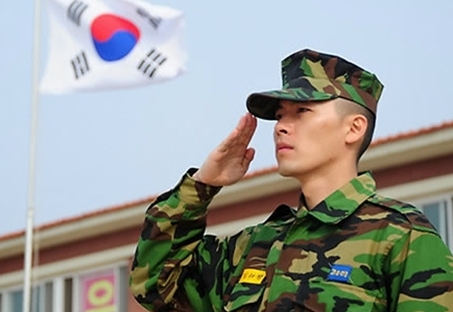 First things first: in October, Koreans celebrated Hangeul Day (the 566th, to be more precise) and from the bottom of my heart, thanks to King Sejong for making Korean learners’ life so much easier with the simplified system (although it might not have been its original intent). And since this month is drawing to an end, welcome to my monthly ramble about positive news coming out of South Korea. As always, feel free to submit commentaries or your articles/news that concern our interest! Let’s begin, shall we?
First things first: in October, Koreans celebrated Hangeul Day (the 566th, to be more precise) and from the bottom of my heart, thanks to King Sejong for making Korean learners’ life so much easier with the simplified system (although it might not have been its original intent). And since this month is drawing to an end, welcome to my monthly ramble about positive news coming out of South Korea. As always, feel free to submit commentaries or your articles/news that concern our interest! Let’s begin, shall we?
LGBT and the Entertainment Industry
Ok, something huge happened, and it came from the world of K-pop. I am guilty of brushing it off easily ‘cause I hate drama-filled videos, but K.Will’s “Please Don’t Go” is a must-watch. Nicholas has already written a review and from the comments I understood it’s somewhat related to TvN’s “Answer Me, 1997.” I would have loved for the video to use the gay relationship for more than just a plot twist, but honestly, it’s as good as it gets. The fact it switches from the ambiguous envy towards the couple to firmly stating the guy loves his boyfriend helps portray the one-sided love in a natural, heartwarming way. From the beginning, the video strongly hints the protagonist might love the girl, but the MV profits from the public’s definition of “normal” only to challenge it afterwards. So as my fellow writer has put it, please don’t give K.Will’s effort a miss:
[youtube http://www.youtube.com/watch?v=PdUiCJnRptk&w=500&h=281]A while earlier I talked about the movie Two Weddings and a Funeral and I’m back with another announcement: the director plans to (unofficially) marry his partner next year. Kim Jho Kwang-soo is a 48-year old movie director and one of the few openly-gay in this biz. He participated and directed many movies about LGBT issues such as Boy Meets Boy and No Regret. The fact he stands behind the camera partially eased his way, though not with much. He announced he has been in a relationship for eight years with his actual boyfriend and had it been for legal acceptance, he would have been married by now.
Foreigners and Their Human Rights
 Recently, there was a report on a few arrests of husbands who have beaten their foreign wives. The report though brought forth a much larger issue. A number of foreign women come to South Korea because of their less favorable economic background or through a mail-order bride service, but they’re not always very aware of their rights and may face abuses in their marriage. The two top reasons Korean men opted for to justify their choice of a foreign wife instead of a local one was that they’re less demanding when it comes to social and academic background and because they feel they will be submissive. In these conditions, it’s incredibly beneficial when officials speak for better legal measures to protect these persons. Moreover, at the BIFF (Busan International Film Festival), Mai Ratima was screened, a movie about an immigrant from Thailand, abused by her husband, who starts falling in love with Soo-young, a penniless Korean guy.
Recently, there was a report on a few arrests of husbands who have beaten their foreign wives. The report though brought forth a much larger issue. A number of foreign women come to South Korea because of their less favorable economic background or through a mail-order bride service, but they’re not always very aware of their rights and may face abuses in their marriage. The two top reasons Korean men opted for to justify their choice of a foreign wife instead of a local one was that they’re less demanding when it comes to social and academic background and because they feel they will be submissive. In these conditions, it’s incredibly beneficial when officials speak for better legal measures to protect these persons. Moreover, at the BIFF (Busan International Film Festival), Mai Ratima was screened, a movie about an immigrant from Thailand, abused by her husband, who starts falling in love with Soo-young, a penniless Korean guy.
This time from a different region of the world, hired native English teachers might be compulsory for schools starting next year. Foreign teachers have been under fire for some time in South Korea, so to soften the reactions, these teachers are expected to receive cultural training. The aim is to both help them get through their cultural shock, keep awareness of basic manners and habits in South Korea and to make their students and people around them more indulgent overall.
Nobel Prizes and Prides
Ko Un is a multi-awarded Korean writer who has been on the list of Nobel Prize nominees for some time now. He began writing poetry 60 years ago and was nominated for a Nobel Prize each year of the last decade. While he hasn’t won the prestigious award yet, his works have revived discussions about the importance of translations and cultural exchange.
Anther Nobel Prize nominee is a bit more surprising. While her nomination is not recent, but in 2005, Geum Soon-yoon entered again public consciousness when she won the Food Sovereignty Award in the name of her organization, Korean Women’s Peasant Association. KWPA struggles in the context of an urban culture to bring forth the importance of agriculture and also the women’s rights. She was nominated before for a Nobel Peace Prize, but she never won.
Gender Discrimination 101
 While we’re at it, an unusual use of Twitter might be beneficial for feminists. Sung Jae-gi, a head of a male-rights activist group, takes sometimes his rage on Twitter. Another public person made his personal statements on Twitter though: prof. Chin Jung-kwon attempted to denounce on Twitter the online misogyny floating around. You can find a translation here. Still at a discussion level, on the 18th of October an international forum on women’s leadership, attended by various female personalities: Hewlett-Packard CEO Carly Fiorina, former Finnish President Tarja Halonen or Canadian Senator Yonah Kim-Martin. Another event worth mentioning is a marathon to fight breast cancer that counted 30000 participants, organized by Korea Breast Cancer Foundation.
While we’re at it, an unusual use of Twitter might be beneficial for feminists. Sung Jae-gi, a head of a male-rights activist group, takes sometimes his rage on Twitter. Another public person made his personal statements on Twitter though: prof. Chin Jung-kwon attempted to denounce on Twitter the online misogyny floating around. You can find a translation here. Still at a discussion level, on the 18th of October an international forum on women’s leadership, attended by various female personalities: Hewlett-Packard CEO Carly Fiorina, former Finnish President Tarja Halonen or Canadian Senator Yonah Kim-Martin. Another event worth mentioning is a marathon to fight breast cancer that counted 30000 participants, organized by Korea Breast Cancer Foundation.
The issue of comfort women rose again. An unauthorized protest where North Korean women took part was fined by the Unification Ministry with 500,000 won. The protest was held to demand an apology for the sexual slavery they went through, but it was sanctioned. However, the participants (or better said, the organization supporting them) will raise an objection to the ministry. Some other efforts to raise awareness over this issue include South Korean singer Kim Jang-hoon and prof. Seo Kyoung-duk’s poster in Times Square about the infringement of their human rights and a group of cyber-activists who want to inform the general public about the dramatic experiences of these women.
Cultural Invites
Busan holds the seventh Global Gathering, in which people from all cultures can come and expose a defining element of the home-country. The event includes mostly Busan’s sister cities, Fukoka, Shanghai and Vladivostok, but integrates performances from countries around the globe, such as Iran, Indonesia or Kenya. Another event meant to build bridges was Korea-Africa Economic Co-operation Conference, where South Korea pledged to help African citizens in need with a loan of $590M.
And for those who want to learn Korean, a team of researchers has developed a smart phone application, Genie Talk, which automatically translates from Korean to English (or reverse), supposed to be about 15% more effective than Google Translate. To make things even easier, some Songdo public places accept now foreign currency and plan to provide English translations of the menu in the future. Transit passengers will be allowed in the future to pass without a visa — an initiative to boost Korean tourism. A better and more accurate explanation:
Under the new system, all international passengers transferring at Incheon International Airport, except for passengers from 11 countries, will be allowed to enjoy a visa-free transit tour of Seoul and its vicinity areas within 12 hours of arrival.
So these were my news picks for this month! What do you think? Anything you’ve heard and feel like sharing?
(egloos, loserman, Ceci, Yoonhap News [1],[2], Hankyoreh, BIFF, SBS, NoCutNews, Gusts of Popular Feeling, BusanHaps, MKE, KoreaHerald [1],[2] KoreaTimes, BDLive, HanCinema, AsianCorrespondent, TheNextWomen, FoodSovereignty, KoreaBang, ChosunIlbo, StarshipTV, LoenEnt, WS Entertainment)


